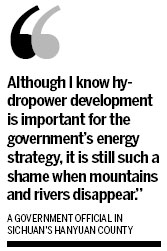Ministry approves environmental impact report on hydro project
Updated: 2013-05-15 07:49
By Yang Yao (China Daily)
|
||||||||

A yearlong assessment of the controversial Shuangjiangkou hydropower project in southwestern China has been given approval on Monday, prompting concern among green campaigners and local residents.
Despite critics claiming the dam - on the upper reaches of Dadu River in Sichuan province - would affect water quality, kill fish and result in several nature reserves being submerged, the Ministry of Environmental Protection gave the assessment the green light.
China Guodian Corp has invested 24.68 billion yuan ($4 billion) in the hydropower project, which started construction in 2008. The project is expected to generate an installed capacity of 2,000 megawatts.
Its reservoir will hold 3,135 billion cubic meters of water and have a catchment area of 39,330 square kilometers.
According to the assessment report, the plans are in accordance with China's energy development plan.
However, Liu Shukun, a professor at China Water Resources and Hydropower Institute, said cascading dam projects such as this do influence the ecological system.
"The chemical, thermal and physical changes that flowing water undergo, when it is stilled, can seriously contaminate a reservoir or river downstream," he said.
"That causes blue-green algae, the death of fish, and an increase in turbidity.
"A negative influence of aquatic ecology and sediment accumulation would occur as the water quality deteriorates."
Liu suggested that it is better to preserve at least 50 percent of the river course, instead of creating a cascade development, which sees a flowing river fed into one reservoir after another.
This was recognized in a notice by the Ministry of Environmental Protection in September, he added, as there have already been seven cascades built on Dadu River. Shuangjiangkou is on the fifth.
In addition to influencing the river, the project will also affect, or completely submerge, six national-level nature reserves and the Dadu River Valley National Geopark, said Chen Gang, a senior engineer for Guodian, in an article published in Hydropower magazine.
Meanwhile, a government official in Sichuan's Hanyuan county, who asked not to be identified, said the Dadu River would be unrecognizable from the waterway he remembers from his youth.
"The naturally turbulent flow of the river will be gone forever," he said.
"Although I know hydropower development is important for the government's energy strategy, it is still such a shame when mountains and rivers disappear.
"My son will never witness that natural beauty," he said, remarking that the banks of the river - the largest tributary of the Yangtze River - are now largely construction sites.
To help the project pass the assessment, Guodian pledged several measures to prevent or reduce any negative impact.
A 60-km unexploited river course from Jinba to Danba would be preserved for fish habitat, for instance, according to information in the report disclosed on the ministry's website.
It also said no wasteland or construction sites would be created in the nature reserves, while a rare botanical garden as well as a forestry research institute would be created to help preserve local forestry.
After being approved, the assessment has been released for a five-day public consultation period.
Objections or suggestions regarding any negative environmental impact can be raised within the period.
"Any project that poses such huge potential risk should only be completed with public approval," said Yang Yong, a geologist with Hengduan Mountain Research Society, an independent research institution.
"It's important to let the public know how construction decisions are made. A full discussion as well as thorough scientific research is needed."
Wu Wencong contributed to this story.
yangyao@chinadaily.com.cn
(China Daily 05/15/2013 page5)

 Michelle lays roses at site along Berlin Wall
Michelle lays roses at site along Berlin Wall
 Historic space lecture in Tiangong-1 commences
Historic space lecture in Tiangong-1 commences
 'Sopranos' Star James Gandolfini dead at 51
'Sopranos' Star James Gandolfini dead at 51
 UN: Number of refugees hits 18-year high
UN: Number of refugees hits 18-year high
 Slide: Jet exercises from aircraft carrier
Slide: Jet exercises from aircraft carrier
 Talks establish fishery hotline
Talks establish fishery hotline
 Foreign buyers eye Chinese drones
Foreign buyers eye Chinese drones
 UN chief hails China's peacekeepers
UN chief hails China's peacekeepers
Most Viewed
Editor's Picks

|

|

|

|

|

|
Today's Top News
Shenzhou X astronaut gives lecture today
US told to reassess duties on Chinese paper
Chinese seek greater share of satellite market
Russia rejects Obama's nuke cut proposal
US immigration bill sees Senate breakthrough
Brazilian cities revoke fare hikes
Moody's warns on China's local govt debt
Air quality in major cities drops in May
US Weekly

|

|







